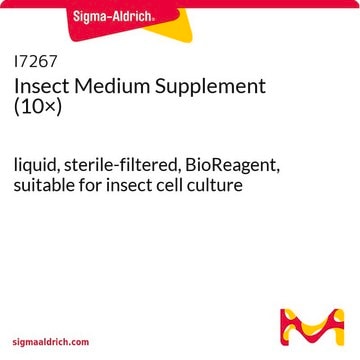V1007
Vanderzant vitamin mixture for insects
Animal-component free, BioReagent, suitable for insect cell culture
Synonym(s):
Insect Vitamin Mixture, Vanderzant Vitamin Mix
Sign Into View Organizational & Contract Pricing
All Photos(1)
About This Item
UNSPSC Code:
12352205
NACRES:
NA.75
Recommended Products
biological source
synthetic (organic)
Quality Level
product line
BioReagent
form
powder
technique(s)
cell culture | insect: suitable
color
light orange
storage temp.
2-8°C
Application
Vanderzant vitamin mixture for insects has been used in:
- the modified Lygus sp. diet for rearing Nezara viridula
- artificial diets to analyze the preference and developmental performance of Drosophila suzukii
- chemically defined diets to study the influence of diet and environment on the gut microbial community of field crickets
Storage Class Code
11 - Combustible Solids
WGK
WGK 2
Flash Point(F)
Not applicable
Flash Point(C)
Not applicable
Personal Protective Equipment
dust mask type N95 (US), Eyeshields, Gloves
Certificates of Analysis (COA)
Search for Certificates of Analysis (COA) by entering the products Lot/Batch Number. Lot and Batch Numbers can be found on a product’s label following the words ‘Lot’ or ‘Batch’.
Already Own This Product?
Find documentation for the products that you have recently purchased in the Document Library.
Customers Also Viewed
Yvonne Young et al.
Ecology and evolution, 8(5), 2842-2851 (2018-03-14)
Since its arrival to North America less than a decade ago, the invasive Spotted-Wing Drosophila (Drosophila suzukii) has inflicted substantial economic losses on soft fruit agriculture due to its ability to oviposit into ripening fruits. More effective management approaches for
Maribel Portilla et al.
Journal of insect science (Online), 21(5) (2021-10-08)
A method for rearing the southern green stinkbug, (Nezara viridula L.) (Heteroptera: Pentatomidae), using a modified lygus semi-solid artificial diet was developed. First to second-instar nymph were reared in a density of 631.5 ± 125.05 eggs per Petri-dish (4 cm
Soon Hwee Ng et al.
Ecology and evolution, 8(9), 4704-4720 (2018-05-16)
The extent to which diet and environment influence gut community membership (presence or absence of taxa) and structure (individual taxon abundance) is the subject of growing interest in microbiome research. Here, we examined the gut bacterial communities of three cricket
Man P Huynh et al.
PloS one, 12(11), e0187997-e0187997 (2017-11-18)
The western corn rootworm (WCR), Diabrotica virgifera virgifera LeConte, is the most serious insect pest of corn (Zea mays L.) in the United States and parts of Europe, and arguably one of the world's most expensive pests to control. Several
Fatemeh Kiaeian Moosavi et al.
Archives of insect biochemistry and physiology, 103(4), e21655-e21655 (2020-01-19)
Some studies have highlighted benefits for Lobesia botrana by adding Botrytis cinerea mycelium to an artificial larval diet and have suggested a mutualistic relationship between the two organisms on grapevine, hypothesizing that fungal sterols were the nutritional factor involved. Because
Our team of scientists has experience in all areas of research including Life Science, Material Science, Chemical Synthesis, Chromatography, Analytical and many others.
Contact Technical Service













